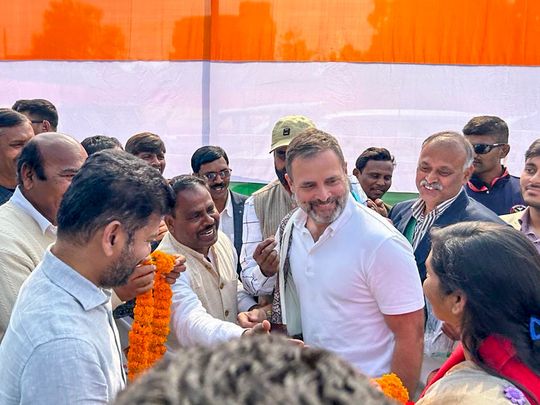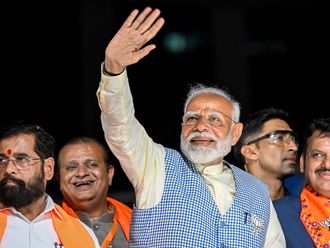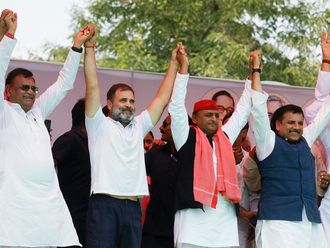
These are difficult times for India’s oldest political party, the Indian National Congress, as also for its leader, the Nehru-Gandhi scion, Rahul Gandhi. The ruling Bharatiya Janata Party (BJP) led by its charismatic leader, prime minister Narendra Modi, seems unstoppable. With the general elections just a few weeks away and battle all but lost, what can Gandhi do to save his party and himself?
Precious little, it would seem. Gandhi has shown himself to be unrealistic when it comes to hard politics. Rather than walking practically solo across the country on his Bharat Jodo Nyaya Yatra, shouldn’t he be seen in the nation’s capital, trying to marshal all his troops before upcoming battle royale?
With the Modi momentum reaching an unprecedented crescendo after the inauguration of the Ram Mandir on Jan. 22, Gandhi ought to be in a daily and well-publicised huddle with his advisers, party members, and allies to strategise how best to save the day. Instead, with his camp office shifting day by day, Gandhi is, once again, the absentee political heir, doing his own thing at the expense of the greater good of his party and supporters.
Don’t get me wrong. Gandhi’s walkathons are not a bad idea. In India, many great leaders, from ancient times to the present day, walked their way out of political exile and oblivion. Walking has a beauty and ethics all of its own. One’s feet are on the ground. The contact with the earth is reassuring to common people who are also grounded, so to speak, most of their lives. Walking sends a powerful message. The leader is humble and is not afraid to mingle with and to touch the hoi polloi.
He isn’t flying around in government or private jets like the great ones, descending only to address a rally, then flying to another venue. Walking through cities, towns, villages, and even smaller settlements, he meets all kinds of ordinary people and understands their problems and challenges. No amount of hi-tech feedback or sophisticated analysis can match the granularity of that contact with the populace.
What is more, by walking so persistently, first from south to the north, now from the east to the west, Gandhi is asserting a moral right to lead not just the Congress, but the opposition. He is signalling to cadres as much as to the BJP bosses that he will not simply roll over and disappear from the hustings without so much as a squeak or whisper. True.
These yatras or journeys across the country may serve well to bolster Gandhi’s own stature, even endow him with a heroic aura, winning him tons of sympathy and some degree of respect too. But — and here’s the rub — will so much walking translate into votes in the upcoming general elections?
Defections and desertions
If not, then what good will the Bharat Jodo Nyaya Yatra do? It will only end up emphasising that Gandhi is not a pragmatic politician but one who prefers, even at considerable risks, to walk alone. But this is not the time to walk alone. The Congress, despite all its setbacks, remains India’s principal opposition party. That’s the good news. But that bad news is that the I.N. D. I. A alliance has all but crumbled.
The responsibility on Gandhi’s shoulders is thus even greater. Sometimes, it is the demand of the times that forces one to assume a role bigger than what one is cut out for. Will Gandhi be able to step up to such a role? But such questions cannot be answered in the abstract. Only the number of seats won by the Congress will determine whether the Gandhi scion has come of political age and maturity or remains the perpetual apprentice and intern.
Inclusivity, social justice, kindness to minorities, economic populism, and, above all, the caste calculus — all the major planks of Gandhi’s Congress have been effectively countered, even appropriated, by the BJP. What is left for Gandhi now? Except to complain bitterly or try to defame the government and its leadership?
Clearly, this will not work. Trying to gather and garner the discontent or deprivation of certain sections of the society, such as the unemployed or underemployed youth, is also not paying dividends. Most of them feel that their prospects are better with Modi. Aspirational India is not backing Gandhi or the I.N. D. I. A alliance.
Crystal gazing is always hazardous, especially in Indian politics. But one can be almost sure that if the Congress performs badly in the 2024 general elections, it will undergo a major shake-up. Not only will a serious challenge be mounted to the Gandhi family’s hold on the party, but defections and desertions may result in the disintegration of the party.
Even in terms of intergenerational dynastic politics, the party which was India’s broad tent against British imperialism, which then became more and more narrowly identified with the Nehru-Gandhi dynasty, may finally be brought to an end by the fifth generation of the family. From Motilal, to Jawaharlal, to Indira, to Rajiv, to Rahul — the story across five generations may finally result its death-knell sounded by Rahul.
Only Rahul himself can decide that this will not be the case, that this will not be his signal role and final legacy when it comes to the destiny of India’s grand old party.











